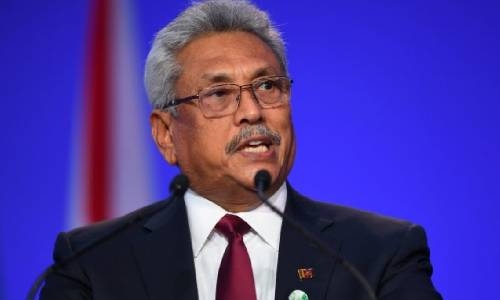Sri Lankan President revokes emergency rule ordinance
Agencies | Colombo
The Daily Tribune – www.newsofbahrain.com
Sri Lanka’s President Gotabaya Rajapaksa revoked a state of emergency late on Tuesday after dozens of lawmakers walked out of the ruling coalition, leaving his government in a minority in parliament as it struggled to quell protests amid the country’s worst economic crisis in decades.
In another setback for the administration, Finance Minister Ali Sabry resigned a day after his appointment and ahead of crucial talks scheduled with the International Monetary Fund for a loan programme.
Rajapaksa dissolved his Cabinet on Monday and sought to form a unity government as public unrest surged over the ruling family’s handling of the debt-heavy economy that has led to shortages of food and fuel and prolonged power cuts. A doctors’ body also told the government there was an acute shortage of medicines that could collapse the health system.
In a gazette issued late on Tuesday, Rajapaksa revoked the emergency rule ordinance that went into effect last Friday.
“I, Gotabaya Rajapaksa, President of the Socialist Republic of Sri Lanka, hereby revoke the gazette with effect from midnight on 05 April 2022,” the gazette said, referring to the previous order.
Politically, the possible next steps could include the appointment of a new prime minister replacing the president’s elder brother, Mahinda Rajapaksa, or snap parliamentary elections way ahead of a scheduled vote in 2025.
There was no immediate indication of what was being planned.
Sabry said in his resignation letter to the president that he believed he had “acted in the best interests of the country”.
“At this crucial juncture the country needs stability to weather the current financial crisis and difficulties,” he said in the letter seen by Reuters, also offering to resign from his parliamentary seat if the president wanted to bring in someone from outside to replace him.
Street demonstrations against the food and fuel shortages, triggered by a lack of foreign exchange for imports, began last month but have intensified in recent days, leading to clashes between protesters and police in some instances.
Dozens of protesters peacefully gathered near the residence of the prime minister on Tuesday.
WITH THE PEOPLE
The names of the 41 lawmakers to leave the coalition were announced by party leaders in parliament.
They have now become independent members, leaving Rajapaksa’s government with fewer than the 113 members needed to maintain a majority in the 225-member house.
There has been no vote count yet, although Rajapaksa’s minority government could find decision-making more challenging. Independent parliamentarians, however, could continue to support government proposals in the house.
“There are endless shortages of essentials including fuel and cooking gas. Hospitals are on the verge of closing because there are no medicines,” Maithripala Sirisena, leader of the Sri Lanka Freedom Party that withdrew its support for Rajapaksa’s coalition, told parliament.
“At such a time, our party is on the side of the people.”
In a further sign of a desperate shortage of funds, Sri Lanka announced the temporary closure of its embassies in Oslo and Baghdad, and the consulate general in Sydney, from April 30.
The foreign ministry said it was restructuring Sri Lanka’s diplomatic representation due to the “economic situation and foreign currency constraints faced by the country”.
The Government Medical Officers Association, which represents over 16,000 doctors nationwide, said there was an acute shortage of medicines, including life-saving drugs.
“Failure to assure a continuous and adequate supply of essential medical drugs will lead to collapse of the entire health system,” it told the health ministry in a letter.
“This will create a life-threatening situation to our citizens who are already facing an unprecedented crisis situation.”
SHARES RISE
The Colombo Stock Exchange’s All-Share Index jumped about 6% as lawmakers made their positions clear inside parliament.
Sirisena, together with other lawmakers, called on the president and the prime minister to present a clear plan to resolve Sri Lanka’s financial mess.
But opposition parties - reflecting the mood of protests sweeping the country of 22 million people - urged the two brothers to step down. A third brother, Basil Rajapaksa, quit as finance minister on Sunday.
The opposition parties have also rejected a move to form a unity government comprising all parties represented in parliament.
“There should not be a voice that is contrary to the voice on the streets. And the voice is that there should be change,” said Sajith Premadasa, leader of the Samagi Jana Balawegaya, Sri Lanka’s main opposition alliance.
“What the people want is for this president and the entire government to step down.”
A small group of people protested near parliament, as police stood guard with tear gas and water cannons.
“If the government loses its majority, you could see the opposition bringing in a vote of no confidence but there is parliamentary procedure that goes around it first and is unlikely to happen immediately,” said lawyer Luwie Niranjan Ganeshanathan, who specialises in constitutional issues.
If a vote of no confidence is adopted, then the president can appoint a new prime minister, he said.
The opposition can also introduce a resolution to dissolve parliament and call for snap elections, Ganeshanathan added.
Related Posts

